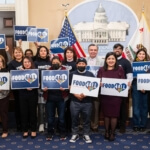No Surprises Here, Still Alarming: Food Insecurity for Our Black and Brown Elders Got Worse
Published on Dec 16, 2021 in CalFresh, Older Adults
Black and Brown older Californians Can’t-Wait for Change and Shouldn't
The pandemic economy brought widespread job loss that hit older workers especially hard, yet the share of older white Americans experiencing food insecurity, defined as limited or uncertain access to adequate food, stayed relatively stable between 2019 and 2020. However, the overall food insecurity numbers disguise a bleak picture for certain racial and ethnic groups, especially our Black and Brown elders. Frankly, enough should be enough.
As a recent study by the AARP Public Policy Institute shows:
Pre-pandemic, older Black Americans faced food insecurity at nearly three times the rate of their white counterparts. Now the difference has grown four-fold. Between 2019 and 2020, food insecurity among older Black adults increased four percentage points(15.5% FY 2019 to 19.7 FY2020), even as it decreased slightly among older white adults (5.9 FY’19 to 5.6 FY’20). Food insecurity also edged up among older Hispanic and Asian Americans, though nearly three times as many Hispanic older adults experience food insecurity as their Asian counterparts; it should be noted that a lack of disaggregation among Asian ethnic groups is known to mask harmful outcomes.
Policy Response to Date Has Been Helpful but Insufficient
Actions like continued disbursement of Emergency Allotments(EA) to households receiving SNAP (the Supplemental Nutrition Assistance Program, known in California as CalFresh), helped millions of older adults put food on the table. Covid-era administrative policy waivers created flexibilities and streamlined the CalFresh application process. But despite those much-needed emergency measures, the data make clear that when it comes to food access, racial and ethnic inequities persist.
Racism as a Root Cause
The Covid-19 pandemic did not create disparate food security outcomes for Black and Brown older adults. Rather, the pandemic is highlighting the ineffective systems that should — but too often do not — readily connect older adults to the nutrition resources that they need to thrive.
Equity-Centered Policies
Government leaders must go beyond the usual policy playbook to address discriminatory policies. Without equity-centered policies, Black and Brown elders are discouraged from utilizing resources like health care, housing, employment, and education shown to improve their overall health and well-being.
A critical first step in understanding the experiences of Black and Brown older adults in California is improving the state’s collection of data on participation and health outcomes by race and ethnicity of federal and state-administered nutrition programs. Decision-makers have for too long interpreted data in a way that treats older adults as a monolith; failing to disaggregate information paints an incomplete picture masking the harmful impacts of discrimination.
We support effective public policy solutions such as the CalFresh Elderly Simplified Application Project (ESAP) supporting easier access to nutrition benefits for older adults and people with disabilities. ESAP has also demonstrated an increase in CalFresh applications and participation while reducing administrative burden and churn.
Leveraging the bold goals of the Master Plan on Aging( MPA), in particular, GOAL THREE: Inclusion & Equity, Not Isolation, this goal centers equity at the core and pursues strategies that recognize and honor California as the most racially, ethnically, and linguistically diverse state in the nation.
Maybe the numbers don’t shock us anymore, who said that shock was a predicate for change? Our Black and Brown elders can’t wait!
Questions? Email | kameron@nourishca.org
You Might Also Find This Interesting...
![]()




